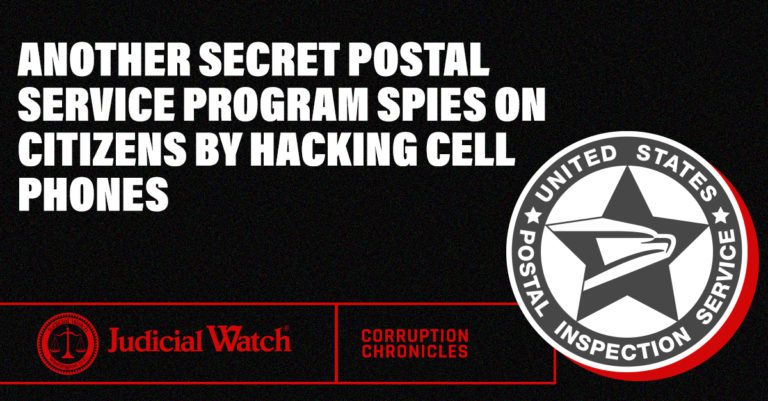
Months after Judicial Watch sued the U.S. Postal Service (USPS) for information about a secret program that tracks and collects Americans’ social media posts, more of the agency’s controversial spy mechanisms are being exposed. The newly uncovered tools are sophisticated hacking devices that can breach cell phones and the USPS’s law enforcement arm, U.S. Postal Inspection Service (USPIS), has utilized them hundreds of times in the last few years, according to a news story that cites USPIS data buried in a lengthy agency report. The questionable surveillance schemes appear to indicate that the government is weaponizing the nation’s postal service to improperly spy on the citizens who fund it.
The social media surveillance program was uncovered early last year by an online news outlet that revealed the USPS has been quietly tracking and collecting the social media posts of Americans, including notes about planned protests. It is known as Internet Covert Operations Program (ICOP). Analysts dig through social media sites searching for “inflammatory” postings, which are shared across government agencies. Civil liberties experts quoted in the story questioned the legal authority of the USPS to monitor social media activity and one asked a logical question: Why would the government depend on the postal service to examine the internet for security reasons? “If the individuals they’re monitoring are carrying out or planning criminal activity that should be the purview of the FBI,” said one civil liberties authority in the piece, adding “if they’re simply engaging in lawfully protected speech, even if it’s odious or objectionable, then monitoring them on that basis raises serious constitutional concerns.”
Judicial Watch quickly launched an investigation, filing a Freedom of Information Act (FOIA) request with the USPS for information relating to ICOP. As the government often does with FOIA requests, it failed to meet the federally mandated deadline for providing the records and Judicial Watch was forced to file a lawsuit in early July. Among the things Judicial Watch asks for in the federal complaint is all records from January 1, 2020 to the present identifying criteria for flagging social media posts as “inflammatory” or otherwise worthy of further scrutiny by other government agencies. It also asks for records relating to ICOP’s database of social media posts, communications between USPIS and FBI or Homeland Security regarding the program and an analysis outlining the authority of the USPIS to monitor, track and collect Americans’ social media posts. Judicial Watch will provide updates as the case evolves.
In the meantime, Judicial Watch is filing a FOIA request with the USPS for information on the devices used by the agency to hack cell phones. The news agency that exposed the alarming operation this week discovered its existence in the USPIS’s 2019 and 2020 annual reports. “Altogether, the records suggest that the USPIS has cracked hundreds of iPhones—generally thought to be one of the most secure commercial phones on the market—as well as other devices,” the article states. The hacking tools are known as Cellebrite and GrayKey and they were used by the agency to extract previously unattainable information from seized mobile devices. In fiscal year 2020, 331 devices were processed and 242 were unlocked and/or extracted, according to information obtained from the USPIS reports. The 2020 document discloses an increase in phone cracking from the previous year.
These clandestine operations within the nation’s postal service should create concern, especially for a troubled agency that has failed miserably to fulfill its mission. The USPS has long been a bastion of mismanagement and frivolous spending that has fleeced American taxpayers out of billions in the last few years alone. In 2021, the USPS reported a net loss of $4.9 billion and in 2020 a net loss of $9.2 billion. One federal audit slammed the USPS for blowing the opportunity to save nearly $22 million had it bothered to maintain its fleet of vehicles more efficiently.
A few years before that the USPS blew hundreds of thousands of dollars on professional sports tickets, booze and fancy meals while it claimed to be crippled by an $8.3 billion deficit. The items were purchased by USPS managers and employees with special charge cards issued to U.S. government agencies. The USPS’s top executives have also been found to receive illegally high salary and compensation packages that should outrage the public. Several years ago, a federal audit found that at least three USPS officers made more than the legal compensation limit for their respective work category while the agency was billions in the red.
